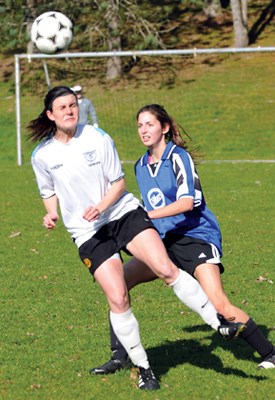TWO of the most powerful forces in women's soccer in North Vancouver have joined forces in what is hoped to be a mutually beneficial agreement that could push the sport to a new level on the North Shore.
Capilano University and the North Shore Girls Soccer Club recently inked a deal that will see them share coaches and resources in an effort to keep more high-level players on the North Shore and boost the performance of both organizations' teams.
The agreement will see the blending of coaching positions with Capilano's head coach also acting as head coach of the club's premier women's team, the NSGSC Eagles of the Pacific Coast Soccer League. Other coaches and support staff will also be shared between the two camps. Capilano's current head coach Darren Rath has already taken the reins of the tryout process as the Eagles gear up for their spring/ summer season. The deal will also see the 3,500member NSGSC contribute three $1,000 awards in each of the next three years earmarked for North Vancouver players who go on to suit up for the Blues in PacWest league play.
Goal No. 1 of the partnership is to address the trend of elite players leaving the North Shore once they get out of the youth system.
"Some of our best players have gone and played in Burnaby or Vancouver or Coquitlam for other teams and we don't think that's the best scenario for our community," said Joe Iacobellis, Capilano's manager of athletics and recreation. "We obviously want to keep our best players here in North Vancouver. It is a win-win situation because if our best girls stay in North Vancouver instead of going to Vancouver, Burnaby, Coquitlam, then we will have stronger programs. Both our Pacific Coast League program and university program will be stronger for it."
There's already more of a buzz around the tryouts for the NSGSC Eagles, according to Dominique Falls, vice president of the club's women's program.
"In the past few years we've struggled kind of getting some bodies out initially for tryouts whereas this year we had like 50 people," she said. "Oftentimes people just see us as ending at U18 and forget that we have the largest women's program in the province."
Another area the agreement may help address is Capilano's recent struggles on the field. Once one of the dominant programs in Canada, the Blues women finished last in the PacWest league this season. With this agreement it is hoped that Capilano players will tryout for the Eagles and its reserve team, the Stars, gaining high-level play and continuity in the spring and summer that they can take into the fall college season.
"You've got continuity in the systems they play, continuity in the technical knowledge of the coaches," said Iacobellis. "They go right from the spring and summer season of the Pacific Coast team right into training camp with the university team."
The partnership emerged out of conversations between several members of both organizations, starting with longtime NSGSC board member Mac Nelson pitching ideas to Iacobellis. Falls said she and Rath had similar discussions about coach sharing while other representatives of both organizations were also discussing ways they could join forces.
"Within a week we'd had three separate conversations that all basically amounted to a very similar idea," said Falls. "It reinforced our idea that it was a good thing to do - we had three separate conversations going on and we all arrived at the same conclusion."
Spurring on the deal is Capilano's commitment to becoming more involved in the community as the school continues its growth from college to university, said Iacobellis.
"One of the most important mandates for the university is community engagement and that comes right down from our president," he said. "We want to get involved with the community, we want to partner with the community in many different ways so that we support the community and the community supports the university. That, to me, is a pretty good reason to do all of this sort of stuff."
All parties are hoping this becomes a long-term success story.
"The idea is to make this long-term and to build a structure and a culture around it," said Falls. "It would be fantastic if we could make Cap a very viable option for our players so that they don't leave unnecessarily. That's what we've found - we've found that players would leave and then they'd come back anyways three or four years later."
"I'm hoping that it's going to provide motivation for the younger girls to work hard and develop because they know now that they have these two programs that they can look forward to," added Iacobellis.



